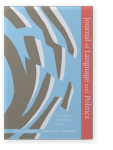Vol. 21:4 (2022) ► pp.544–566
When in parliamentary debate there is no debate
Argumentation strategies during Catalonia’s 2017 referendum
On the 1st October 2017 an independence referendum was organised in Catalonia. The aim of this paper is to analyse the nature of the political debate going on in the Catalan Parliament during the whole process by focusing on the kind of argumentation strategies that were used by each of the leanings to legitimise their political decisions. We do that relying on a methodological distinction that differentiates between sound argumentation and fallacious argumentation. By using a Critical Discourse Analysis approach, this study offers a wide picture of the kind of argumentation used by the main political actors involved in the process of decision making in Catalonia. The results show that there is more emphasis in antagonising with the others, than engaging in sound argument exchange that could facilitate minimal points of consensus. Such results may help explain why the Catalan conflict is still unsolved at the political level.
Article outline
- 1.Introduction
- 2.Literature review
- 3.Methodology
- 4.Analysis
- 4.1Argumentation strategies by pro-secession parties: Constructing the Spanish state as an aggressor to Catalan society
- 4.2Argumentation strategies by Pro-Union parties: Constructing secessionism as a threat that needs to be confronted
- 4.3Argumentation strategies by sovereignty align: Discrediting pro and against leanings
- 5.Conclusions
- Note
-
References
